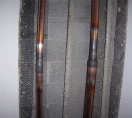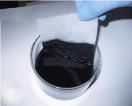FOR IMMEDIATE RELEASE
ACS News Service Weekly PressPac: January 20, 2010
ACS News Service Weekly PressPac: January 20, 2010
Contact
- Science Inquiries: Michael Woods, Editor, 202-872-6293
- General Inquiries: Michael Bernstein, 202-872-6042
![]()
With scientific evidence linking high levels of copper and iron to Alzheimer’s disease, heart disease, and other age-related disorders, a new report in ACS’ Chemical Research in Toxicology suggests specific steps that older consumers can take to avoid build up of unhealthy amounts of these metals in their bodies. “This story of copper and iron toxicity, which I think is reaching the level of public health...
![]()

Could powering an iPod or cell phone become as easy as plugging it into your tee shirt or jeans, and then recharging the clothing overnight? Scientists in California are reporting an advance in that direction with an easier way of changing ordinary cotton and polyester into “conductive energy textiles” — e-Textiles that double as a rechargeable battery. Their report on the research appears in ACS’ Nano Letters...

Scientists are reporting the first evidence from human research that blueberries — one of the richest sources of healthful antioxidants and other so-called phytochemicals — improve memory. They said the study establishes a basis for comprehensive human clinical trials to determine whether blueberries really deserve their growing reputation as a memory enhancer. A report on the study appears in...
![]()

The air in some school classrooms may contain higher levels of extremely small particles of pollutants — easily inhaled deep into the lungs — than polluted outdoor air, scientists in Australia and Germany are reporting in an article in ACS’ semi-monthly journal Environmental Science & Technology. Lidia Morawska and colleagues note increasing concern in recent years over the health effects...
![]()
A blood test for diagnosing schizophrenia — the most serious form of mental illness — could be available this year, according to an article in the current issue of Chemical & Engineering News, ACS’ weekly newsmagazine. The disorder, with symptoms that can include hallucinations and delusional thoughts, affects more than two million people in the United States and millions more worldwide. C&EN Senior Editor Celia Henry Arnaud mentions the test as one part of a much broader discussion of how scientists are…
![]()

- Media Registration ACS 239th National Meeting, March 21-25, 2010, San Francisco
News media accreditation and housing reservations are now open for the 239th National Meeting & Exhibition of the American Chemical Society (ACS), the world’s largest scientific society. It will be held March 21-25 in San Francisco. Reporters and editors can apply for complimentary registration now at meeting registration. Hotel reservations and other information are available at housing. - Press releases, briefings, and more from ACS’ 238th National Meeting
www.eurekalert.org/acsmeet.php
http://www.ustream.tv/channel/acslive - Must-reads from C&EN: Congressional science outlook for 2010
For journalists covering government science and policy issues, this week’s cover story offers a wide-ranging look at the science legislative outlook on Capitol Hill for 2010. Climate change, chemical regulation, chemical weapons, homeland security and energy and the environment will top the list of issues. For a copy of the story, go to Congress. - ACS Pressroom Blog The ACS Office of Public Affairs’ (OPA) pressroom blog highlights research from ACS’ 38 peer-reviewed journals and National Meetings.
- Bytesize Science blog Educators and kids, put on your thinking caps: The American Chemical Society has a blog for Bytesize Science, a science podcast for kids of all ages.
- ACS satellite pressroom: Daily news blasts on Twitter
The satellite press room has become one of the most popular science news sites on Twitter. To get our news blasts and updates, create a free account at https://twitter.com/signup. Then visit http://twitter.com/ACSpressroom and click the ‘join’ button beneath the press room logo. - ACS Press Releases
Press releases on a variety of chemistry-related topics. - General Chemistry Glossary
- Chemical Abstracts Service (CAS) Web site on everyday chemicals
Whether you want to learn more about caffeine, benzoyl peroxide (acne treatment), sodium chloride (table salt), or some other familiar chemical, CAS Common Chemistry can help. The new Web site provides non-chemists and others with useful information about everyday chemicals by searching either a chemical name or a corresponding CAS Registry Number. The site includes about 7,800 chemicals of general interest as well as all 118 elements from the Periodic Table, providing alternative names, molecular structures, a Wikipedia link, and other information. - Science Connections from CAS
CAS - Science Connections is a series of articles that showcases the value of CAS databases in light of important general-interest science and technology news. Topics range from fruit flies to Nobel Prize winners, with the CAS - Science Connections series pointing to CAS databases for a more complete understanding of the latest news.
- Bytesize Science
Bytesize Science is a science podcast for kids of all ages that entertains and educates, with new high-definition video podcasts and some episodes in Spanish. Subscribe to Bytesize Science using iTunes. No iTunes? No problem. Listen to the latest episodes of Bytesize Science in your web browser. - Global Challenges/Chemistry Solutions
This special series of ACS podcasts focuses on some of the 21st Century’s most daunting challenges, and how chemists and other scientists are finding solutions. Subscribe at iTunes or listen and access other resources at the ACS web site www.acs.org/GlobalChallenges. - Science Elements
Science Elements is a podcast of PressPac contents that makes cutting-edge scientific discoveries from ACS journals available to a broader public audience. Subscribe to Science Elements using iTunes. Listen to the latest episodes of Science Elements in your web browser. - SciFinder® Podcasts
Interested in healthful plant phytochemicals, nanotechnology, or green chemistry? Check out the SciFinder series of podcasts, which explore a vast array of current interest topics and new discoveries in the 21st century. The SciFinder podcasts are available in English, Chinese, Japanese, and Portuguese.
Note to Journalists and Other Viewers
This is the latest American Chemical Society (ACS) Office of Public Affairs Weekly PressPac with news from ACS’ 38 peer-reviewed journals and Chemical & Engineering News.
This information is intended for your personal use in news gathering and reporting and should not be distributed to others. Anyone using advance ACS Office of Public Affairs Weekly PressPac information for stocks or securities dealing may be guilty of insider trading under the federal Securities Exchange Act of 1934.
Please cite the individual journal, or the American Chemical Society, as the source of this information.
The American Chemical Society is a nonprofit organization chartered by the U.S. Congress. With more than 161,000 members, ACS is the world’s largest scientific society and a global leader in providing access to chemistry-related research through its multiple databases, peer-reviewed journals and scientific conferences. Its main offices are in Washington, D.C., and Columbus, Ohio.

